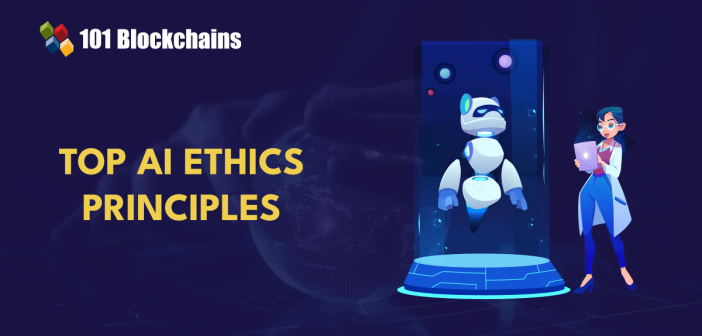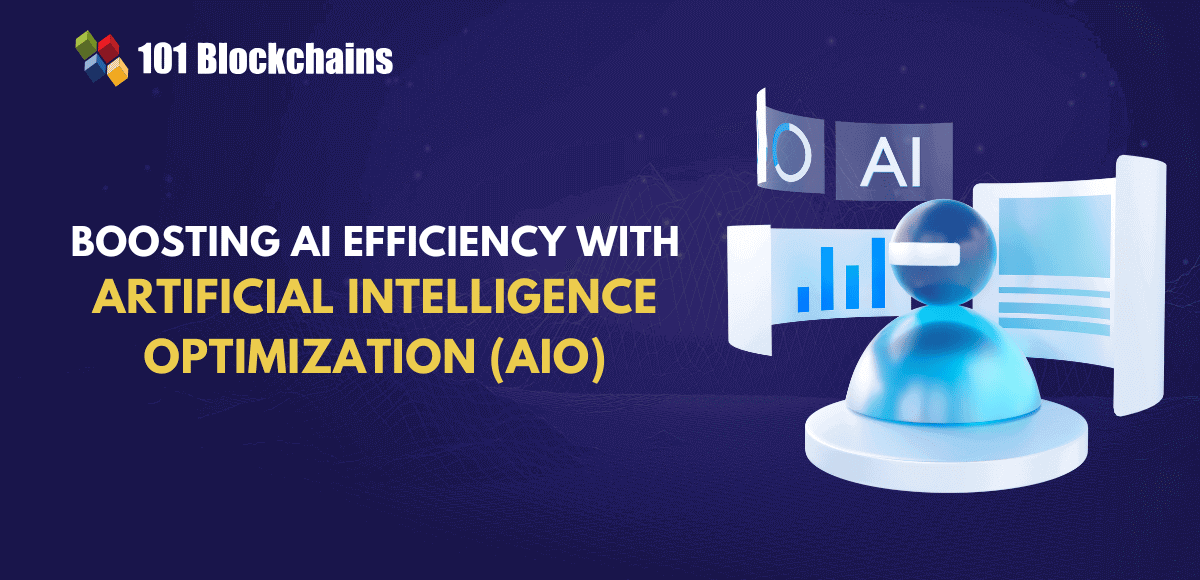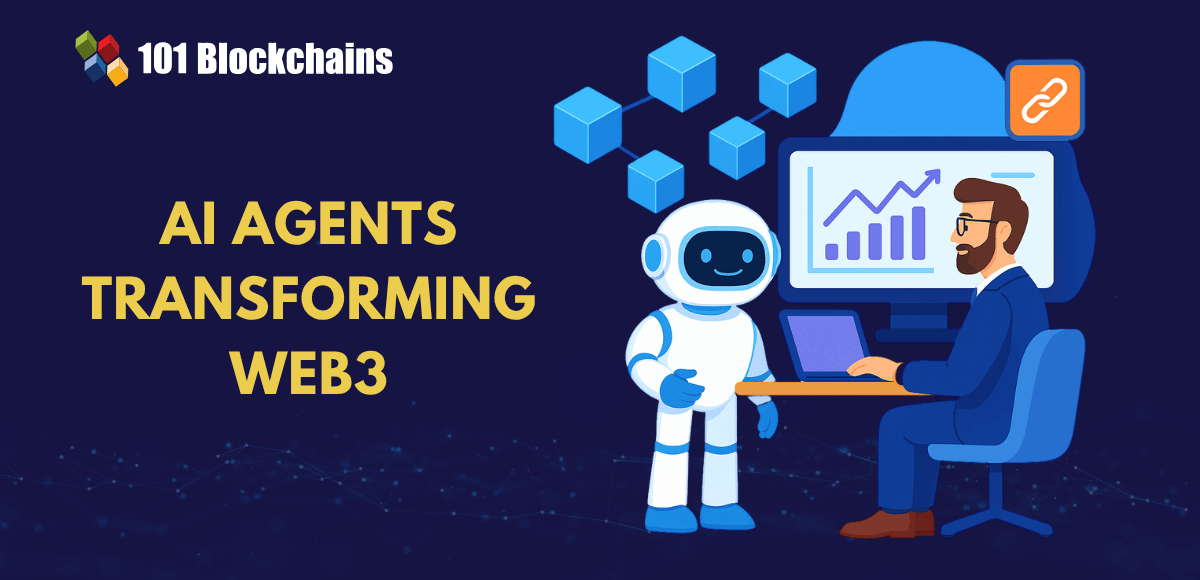Learn how blockchain truly works, master key definitions, and uncover what makes smart contracts so "smart." Dive into the fundamentals, gain valuable insights, and start your blockchain journey today!

- AI & ChatGPT
James Howell
- on December 16, 2023
A Comprehensive List of AI Ethics Principles
The sporadic growth of artificial intelligence has prompted many businesses to seek in-depth insights about the potential of AI. However, there are many ethical concerns associated with the practical use cases of artificial intelligence. Therefore, it is important to understand the top AI ethics principles for ensuring safeguards against ethical concerns of AI. Why should you worry about ethics in AI? Let us take the example of one of the ethical dilemmas with the use of AI to understand the importance of ethics.
Assume that an IT service provider employs 30 people in its customer service team, which handles inbound and outbound calls on behalf of the organization. What if the organization uses an AI-powered chatbot for managing communications with customers? Should the organization remove the 30 employees from the job? The principles of AI ethics help in answering such questions.
The importance of AI ethics principles is clearly visible in the ways in which they guide AI initiatives across different sectors. However, governments, tech vendors, and business communities have been coming up with different versions of AI principles. Let us learn more about the top ethical principles for implementing AI solutions.
What are AI Ethics?
The definition of AI ethics can serve as the first pointer for understanding the principles of ethical AI. Ethics represent a general set of principles for differentiating between right and wrong. If you want to find the answers to ‘What are AI ethics principles,’ then you must know about the significance of ethics in AI.
Ethical principles for AI systems provide the guidelines for responsible development, training, testing, and deploying the system. You can understand the importance of ethical AI by identifying the lack of foresight regarding the implementation of artificial intelligence systems. In such cases, AI systems could lead to disastrous economic and societal consequences.
Businesses should look for the risks and advantages associated with AI adoption. However, creating an extended list of AI principles and implementing them in an organization are completely different things. On the contrary, you must understand the value of ethical principles in AI and the best practices for integrating them into your AI adoption strategy.
Want to learn about the fundamentals of AI Ethics? Enroll now in the Ethics Of Artificial Intelligence Course
Why Do You Need Ethics in AI?
Ethics are the most crucial requirement for defining the responsible development and utilization of artificial intelligence systems. Artificial intelligence has become one of the integral elements of products and services offered by organizations. Therefore, organizations should adopt the best AI ethics principles for creating trust around the use of AI.
Most important of all, you must know about the significance of an AI code of ethics or an AI value platform. It showcases a policy statement that offers a formal definition of the role of artificial intelligence in developing the human race. The code of ethics for AI aims to offer guidance to stakeholders for taking ethical decisions about using artificial intelligence.
The discussions about the ethics of AI emerge from the notions of dangers involved with the applications of AI. Isaac Asimov, the creator of robotics, pointed out that autonomous AI agents could present multiple challenges and risks. Interestingly, the most popular AI ethics principles could address such problems. Asimov outlined the Three Laws of Robotics, which serve as the code of ethics for AI. Apparently, Asimov had come up with his code of ethics way before the development of autonomous AI agents.
- According to the first law of Asimov, robots or autonomous AI agents must not inflict any type of harm on humans or allow any harm due to their actions.
- The second law for AI points out that robots should obey humans, except in circumstances that do not align with the first law.
- Finally, the third law provides instructions to robots to protect themselves while following the first two laws.
Artificial intelligence has been created for replication, improvement, or replacement of human intelligence. The necessity of AI ethics principles is visible in the requirements for utilizing large repositories of different types of data for developing insights. For example, AI projects that use biased or inadequate data could showcase potentially harmful and unintended consequences. In addition, the innovation in AI systems has created challenges in understanding the ways in which AI draws conclusions. Therefore, it is important to have an AI ethics framework guided by proven principles.
Excited to learn the fundamentals of AI applications in business? Enroll now in AI For Business Course
Ethical Challenges in AI
The ideal approach for outlining ethical AI principles would focus on identifying their purpose. What are the problems you want to solve with AI principles? The principles of ethical AI aim at resolving problems, such as explainability, misuse, fairness, and responsibility.
Fairness refers to the challenges emerging from the availability of personally identifiable information or PII. It implies that AI systems should avoid all types of biases in ethnicity, race, or gender.
Explainability is also another important challenge for ethical principles in AI, as AI systems work through a complex assortment of data processes and algorithmic systems. Organizations that use AI systems can experience difficulties in explaining the source data and the output data alongside the working mechanisms of the algorithms and the rationale for their actions. AI should have higher traceability to ensure easier identification of the underlying causes of any discrepancies.
Misuse of AI algorithms is also another prominent ethical challenge associated with AI. The search for answers to “What are AI ethics principles?” would also guide towards the importance of misuse as an ethical issue for AI. Artificial intelligence algorithms could serve diverse purposes, and malicious users could implement AI algorithms for unapproved use cases. Therefore, it is important to evaluate these scenarios at the design stage to minimize risks and introduce safety measures for reducing the adverse effects.
Another noticeable risk associated with ethical AI is responsibility. It is important to define clear responsibilities for the consequences of AI-based decisions. You can find a relation between the problem of responsibility and the solution, i.e., accountability. It is important to find the right balance in some cases where AI systems can serve more helpful results than human activity, albeit with some problems. For example, you can identify the merits of autonomous driving systems, which lead to multiple fatalities, albeit ensuring better safety than human driving.
Take your first step towards learning about artificial intelligence with all the definitions of important AI concepts and terms with simple AI Flashcards
How is an AI Code of Ethics Important for Ethical Principles in AI?
The code of ethics is like a framework to ensure ethical AI implementations while resolving problems in three different areas. AI code of ethics provides a clear glimpse of the AI ethics principles that would support responsible use of AI. The three notable areas prioritized in an AI code of ethics include policy, technology, and education. Let us find out more about the three elements of an AI code of ethics to understand how they fit with AI principles.
-
Policy
Policy development helps in creating the ideal framework to ensure standardization and effective ways for defining regulations for responsible AI. For example, the Asilomar AI principles serve as a major force for beginning a conversation. In addition, other definitions of ethical AI policies have been emerging as prominent benchmarks for defining new ethical principles for artificial intelligence.
The objective of top AI ethics principles also focuses on addressing legal issues. Organizations should integrate AI policies into their code of ethics. However, the effectiveness of AI principles depends on the compliance of users and employers to the specified requirements.
-
Awareness
The next important element in defining AI ethics is awareness or education. Data scientists, consumers, executives, and front-line employees must understand policies, potential negative impact of unethical AI, and important considerations. The biggest concern related to the tradeoff between flexibility for data sharing and AI automation alongside the negative repercussions of adverse automation or oversharing.
-
Technology
How can organizations follow the most popular AI ethics principles to perfection? Executives have to create AI systems that can detect unethical behavior and fake data. For example, organizations should use AI systems for detecting deepfakes or sophisticated cyber-attacks. It is important to ensure that organizations have open, trusted, and transparent AI infrastructure.
Enroll in our Certified ChatGPT Professional Certification Course to master real-world use cases with hands-on training. Gain practical skills, enhance your AI expertise, and unlock the potential of ChatGPT in various professional settings.
What are the Most Popular AI Ethics Principles?
The advantages of principles for ethical AI could help businesses in many ways. You should know that the core values of ethical principles focus on betterment of societies, environment, humanity, and individuals. The best AI ethics principles follow these core values for offering the benefits of responsible and credible AI. Interestingly, UNESCO has reported recommendations on the ethics of AI for defining the fundamental principles of ethical AI. Here is an outline of the ethical principles for responsible use of AI.

-
No Harm and Proportionality
AI systems should be used only for the objectives they have been created to address. It means that AI systems should not do anything out of the blue other than the essential practices for achieving a legitimate objective. Risk assessment is an important requirement for preventing any issues that might arise with such applications.
-
Security
The next important addition to answers to “What are AI ethics principles?” is security. All AI stakeholders should avoid and resolve concerns due to unwanted damage, such as safety risks. In addition, it is also important to revolve the vulnerabilities to attacks or security risks.
-
Right for Data Protection and Privacy
Privacy is also one of the key elements in ethical principles for artificial intelligence. All AI actors should safeguard and promote privacy throughout the AI lifecycle. In addition, it is also important to establish comprehensive data protection frameworks.
Identify new ways to leverage the full potential of generative AI in business use cases and become an expert in generative AI technologies with Generative AI Skill Path
-
Responsibility and Accountability
AI systems should provide flexibility for auditing and traceability. Some of the important mechanisms required to safeguard ethical AI principles of responsibility and accountability include due diligence mechanisms, impact assessment, and audits. All of these factors help in avoiding conflicts with human rights regulations and risks to environmental safety.
-
Fairness
Fairness of non-discrimination is one of the general principles recommended by UNESCO for safeguarding AI ethics. All the agents involved in AI systems should promote fairness, non-discrimination, and social justice. The principle of fairness aims at following an inclusive approach to ensure that the benefits of AI are accessible to every individual.
-
Adaptive Governance and Multi-Stakeholder Collaboration
Data is the lifeblood of AI systems. Therefore, it is important to ensure that AI systems comply with international law for the use of data. At the same time, it is also important to respect national sovereignty. The list of ethical principles in AI also emphasizes the need for participation of diverse stakeholders. The involvement of multiple stakeholders is also a crucial principle for ensuring inclusive approaches in governance.
-
Human Oversight
One of the most crucial factors in safeguarding ethical principles for AI points to the concerns due to replacement of human workers with AI. UNESCO implies that all member states should ensure that AI systems never replace human accountability and responsibility.
Want to learn about the fundamentals of AI and Fintech? Enroll Now in AI And Fintech Masterclass
-
AI Awareness
The collection of ethical AI principles also includes awareness and literacy about artificial intelligence. Public awareness regarding data and AI should be the first priority for encouraging adoption of AI systems. The methods for encouraging AI awareness include digital skills and AI ethics training, civic engagement, media and information literacy, and open and accessible education.
-
Sustainability
AI systems should go through an assessment for evaluation of their impact on sustainability. Artificial intelligence systems should be developed in accordance with the Sustainable Development Goals of the United Nations.
-
Transparency
The principles for ethical AI also include transparency, as it is a core element for ethical deployment of artificial intelligence. At the same time, it is also important to ensure that the level of transparency aligns with the context. In addition, it is also important to ensure that transparency does not meddle with other principles like security, safety, and privacy.
Develop expert-level skills in prompt engineering with the Prompt Engineer Career Path
Conclusion
The principles for ethical AI provide a definitive framework to ensure responsible design, development, and utilization of artificial intelligence systems. You can notice how the most popular AI ethics principles prepare the safe and responsible use of AI with transparency. Artificial intelligence has the capability to emulate human intelligence, thereby establishing possibilities for ethical concerns.
On the other hand, you could not find a single framework for principles for ethical use of AI. For example, UNESCO has charted the essential principles for ethical use of AI. At the same time, you can also refer to Asilomar AI principles for guidance on establishing responsible AI systems. Learn more about AI fundamentals and how ethics plays a major role in AI.






